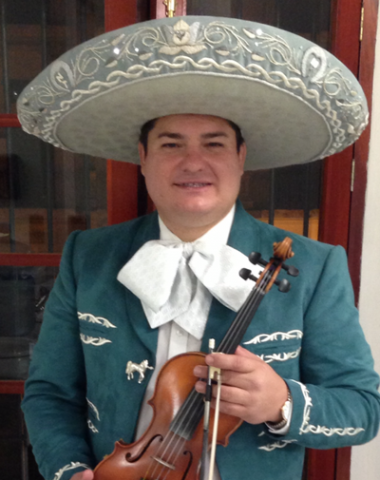the UCLA Chicano Studies Research Center,
the Arhoolie Foundation,
and the UCLA Digital Library
 When it comes to bands with longevity, the Rolling Stones may be the elders of rock n’ roll. But the 52-year-old British group is still wet behind the ears compared to Mexico’s Mariachi Vargas de Tecalitlán, founded 117 years ago. Now in its 5th generation, the mariachi known as “el major mariachi del mundo” -- the best in the world -- is on an extensive U.S. tour through the end of the year. Starting this Cinco de Mayo weekend in Tampa, Florida, the revered ensemble has 29 dates currently scheduled, hopscotching the border from Tijuana to Topeka and Guadalajara to Costa Mesa. A complete tour schedule is posted here at MariachiMusic.com, a San Antonio-based website dedicated exclusively to the genre.
When it comes to bands with longevity, the Rolling Stones may be the elders of rock n’ roll. But the 52-year-old British group is still wet behind the ears compared to Mexico’s Mariachi Vargas de Tecalitlán, founded 117 years ago. Now in its 5th generation, the mariachi known as “el major mariachi del mundo” -- the best in the world -- is on an extensive U.S. tour through the end of the year. Starting this Cinco de Mayo weekend in Tampa, Florida, the revered ensemble has 29 dates currently scheduled, hopscotching the border from Tijuana to Topeka and Guadalajara to Costa Mesa. A complete tour schedule is posted here at MariachiMusic.com, a San Antonio-based website dedicated exclusively to the genre.
The website also features an interview with Carlos Martínez, the young musician recently named musical director of the legendary mariachi. The interview, which can be found here, was conducted by mariachi musician and historian Jonathan Clark, of San Jose. Fans may recall that Clark, one of the most diligent chroniclers of the genre and its exponents, wrote the chapter on mariachi music in the award-winning book about UCLA’s renowned digital archive, The Strachwitz Frontera Collection of Mexican and Mexican American Recordings, published by the UCLA Chicano Studies Research Center Press. In the interview, the wide-eyed Martinez describes his thrill at being passed the director’s baton directly from the legendary Ruben Fuentes himself, who joined the band as a violinist in 1944.
Of course, if you can’t make any of the tour dates, you can hear plenty of Mariachi Vargas classic recordings here on the Frontera Collection site. Several of the early 78 rpm recordings are instrumentals that showcase the group’s intricately crafted arrangements. They feature a single trumpet, played with finesse rather than bombast. One caught my attention, the polka “De Torreon a Lerdo,” because the title refers to my hometown area known as La Laguna, in Coahuila state. It’s backed by the song jaliciense “La Negra,” a classic of the genre.
-AgustÍn Gurza
0 Comments
Stay informed on our latest news!
Add your comment